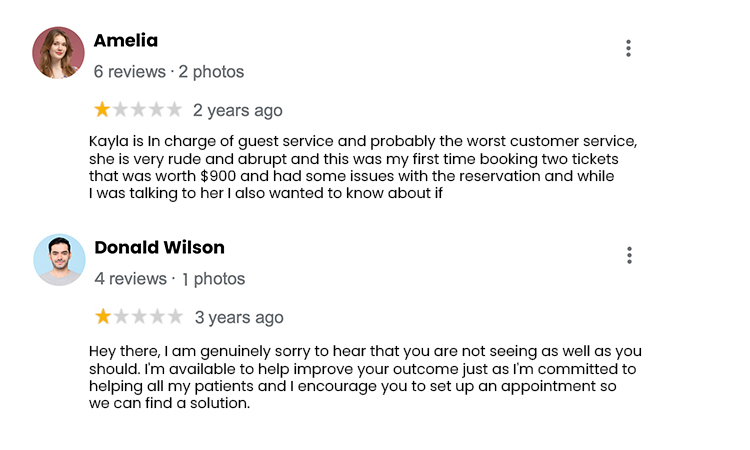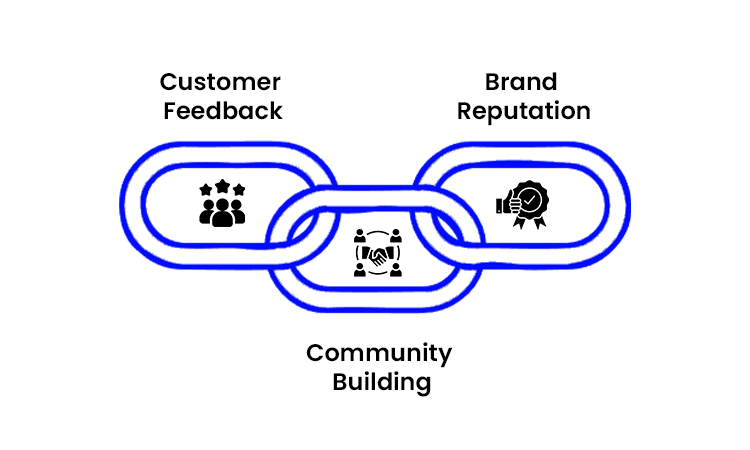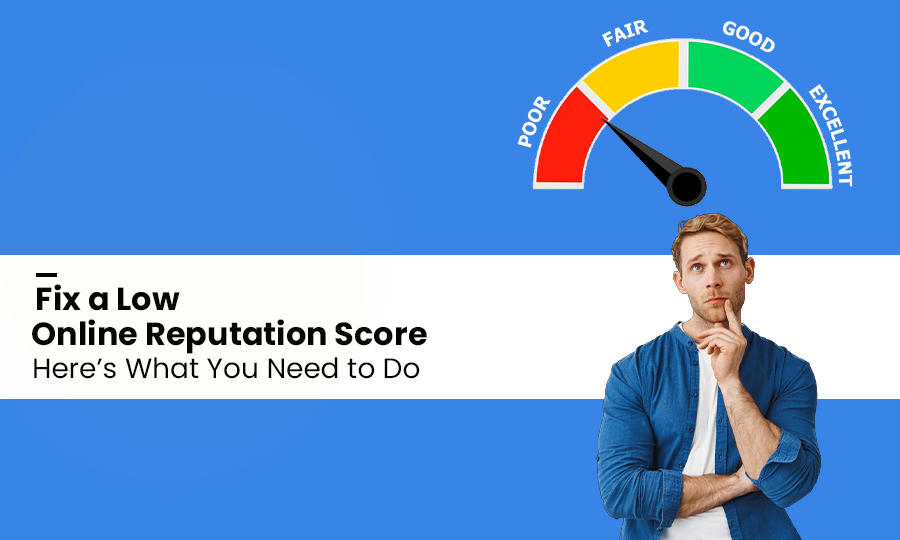“Your brand is what people say about you when you’re not in the room.”
The current market has evolved significantly, as digitalisation has brought numerous changes in different marketing programmes. However, as the market has become more competitive, the collective ideas of market reputation have changed, based on several factors. So, you cannot remain indifferent towards your brand reputation, as low online reputation score can surely lead you to bizarre experiences.
What is the Business’s Reputation Score?
An online reputation score stands for a graded or numerical representation of how a brand, individual or business is perceived among customers. It refers to a metric, reflecting customer engagement, sentiment and perception observed in several digital platforms, including social media, reviews and search results. While a positive online reputation score highlights a credible and positive digital presence of a company, a negative reputation score portrays the opposite.
History and Significance of Online Reputation Score: The Emergence of the Idea of a Good Reputation
The concept of online reputation emerged as technological advancement became a key factor in the global business landscape. In the late 1990s, several ideas and practices regarding online reputation bloomed significantly, and turned into a key influential factor in customers’ decision-making. Initially, online reputation was limited to some specialised websites like eBay.
Eventually, other platforms, like Deja, Epinions and RatelAll emerged, allowing customers to share their experiences and reviews regarding products and services. This is considered as a landmark in the history of global business, as customers became an integral part of developing a company’s market acceptance and future business activities. However, online reputation and reputation score represent a brand’s social media presence, while a strong online reputation can improve your digital presence and business opportunities.
What is a Low Online Reputation Score?
As digitalisation captured the root of the global business attire, nothing remains just a piece of cake.
If you delve into the contemporary market conditions, you will find that digital and social media channels heavily influence the market position of companies, involving customers’ perceptions. A low online reputation score refers to a negative image of a brand among people. To be more specific, it highlights two important ideas.
- Firstly, it means that when others search for the brand on digital platforms, they find inaccurate, unreliable and outdated data regarding products and service quality.
- Secondly, the new customers may not want to pursue the products and go for alternatives with a better reputation.
It is needless to say that both these factors reduce product sales, customer engagement and future business opportunities.
Why is it Important to address?
Low reputation score affects the organisational acknowledgement in the digital sphere, and eventually, companies face backlashes from customers and competitive threats. In this regard, it is essential to address reputational challenges to maintain deliverability, ensure transparent business operation and protect brand reputation.
It must be done for phone numbers or emails, as a low reputation score marks emails and phone numbers as spam, enhancing the negative perception of brands. It is also essential to increase competitive advantages in the global and regional markets and reach the target audiences. However, it must be addressed in a timely manner to avoid long-term challenges regarding a bad reputation score.
Key Strategies to Fix the Challenges regarding a Low Online Reputation Score
1. Addressing Negative Online Reviews

Well, the ball might not be in your court, as the online platforms are deeply driven by customer engagement and their perceptions regarding brands and services. In this regard, you need to act promptly to acknowledge negative comments and reviews regarding your brand.
Let’s say your brand sells household commodities, and customers are not happy about their latest purchase. Eventually, you will see that your brand receives negative feedback on digital platforms, influencing customers who were yet to purchase products from your company. In this regard, you need to professionally deal with customer complaints.
You must have a helpful and positive tone while addressing negative feedback and offering solutions. However, you should ensure that your websites are mobile-friendly and easy to navigate. You should consider valuable insights regarding your brands and gain insights from customers to ensure significant control over review responses and user-generated content.
Moreover, you need to consider a valuable search engine for sentiment analysis and reputation monitoring to procure more positive reviews. You may consider online conversations with customers and analyse customer feedback for developing new business insights, ensure a better customer experience and address negative reviews.
2. Social Media Engagement and Customer Feedback

“Jumping on the bandwagon”.
It often refers to people’s choices to follow any social media trend and practices.
However, it reflects the significance of social advertising channels in influencing people’s choices and ideas regarding their personal and professional requirements. In this regard, you need to be active on your social media channels and post regularly to stay relevant among customers. You should consider social media to interact with your audience and respond to their negative and positive comments.
On the other hand, you might hear rumours regarding your brand due to some unethical intervention from some external factors, leading to a low reputation score. You need to communicate with customers and provide comprehensive ideas about products and services.
Improving online reputation protection strategies can be achieved by focusing on personal reputation, as a business’s overall reputation score is heavily influenced by the credibility and public perception of its key personnel. You can analyse how customers perceive your brand, and in this regard, you may consider a search engine and different data points. The online reviews derived from social media can also be driven by the personal reputation score of personnel.
3. Gathering Positive Reviews for a Positive Reputation

Research shows that the correlation between increasing annual revenue and high reputation scores plays a key role in developing the market presence of companies. These two factors are directly proportional to each other. Companies with 4 to 4.5-star ratings are expected to earn their annual revenue. Brands need to communicate with satisfied customers to obtain reviews on several platforms like Facebook, Yelp and Google.
On the other hand, you should consider relevant review platforms such as BrightLocal, and Cision to manage and collect reviews for further analysis. You can also empower the positive outlook of your brand by providing incentives to increase customer loyalty.
For example, you can offer discounts and offers for your loyal customers, influencing their perception of your brand, which can enhance the brand recognition on a significant scale. However, the poor reputation issues must be addressed by using relevant keywords and online search results.
A positive reputation can be generated through review websites and effective communication with the online community. In this regard, you should consider news sites where your brand has been featured, along with public opinion. To improve your online reputation, you should not only focus on gaining new customers, but also on not to lose customers. Reputation repair services can be advantageous for your brand to fix low reputation scores.
4. Developing a Consistent Branding for a Company’s Reputation
As the market has evolved, the online community plays an important role in influencing business success and brand reputation. You need to create business-based guidelines and empower a regular audit across all business touchpoints.
Incorporating a well-structured branding style can effectively mitigate challenges related to a low online reputation. You may consider visually attractive logos, fonts, colours and images, along with a well-developed brand tone and voice to increase positive customer engagement. You need to share the core values of your brand for reputation monitoring, as well as, brand mission, which will be the key foundation of your entire business strategy.
It is effective to increase the online reputation score and media presence, as well as online reputation management. However, you should consider sentiment analysis to understand people’s preferences and share relevant content to ensure positive feedback from review sites.
Importance of Strategies to Address a Low Online Reputation Score and Challenges Regarding Digital Presence
1. Improving Business Reputation and Customer Engagement
A brand’s reputation score plays a key role in determining its future in the market and whether it’s able to provide customer-centric services or not. As observed, negative reviews affecting reputation score create several dilemmas for companies to increase customer engagement and business opportunities. However, the strategies can be valuable to procure positive reviews as per brand performance, leading to a good reputation score. The challenges regarding a bad reputation score can be addressed by increasing brand visibility and brand identity perceived online to improve online reputation management.
2. Increasing Social Media Engagement
Social media engagement is particularly essential for business success, as the reputation score derived from social media channels plays a key role in influencing customer feedback. As a positive reputation score represents a well-perceived value of a brand, it empowers the reputational practices on a significant scale.
3. Dealing with Reputational Challenges
A bad reputation score can also be addressed through effective website presentation to improve the business reputation score and business performance. The well-monitored online reviews are advantageous in dealing with reputational challenges, as they provide better opportunities for business listings. However, the media presence of a brand must be analysed using free reputation analysis, which can be effective in dealing with a poor reputation score.
4. Improving Google Reviews
Apart from other digital media reviews, Google reviews are beneficial in developing a good brand reputation, business listings and reputation monitoring, as people’s engagement will be advantageous to improve business performance. Along with a strong media presence, Google reviews enhance brand ideas and how they are perceived online. Positive reviews and customer satisfaction are intertwined to create a stable business performance, empowering the online reputation of brands and their reputation score.
5. Improving Organisational Performance
The consistent branding strategies are significant to enhance the overall reputation score and organisational performance on social media channels. The reputation management programmes can be effective in developing new potential customers for brands, while a strong reputation score can be effective in attracting new customers. Addressing a bad reputation score based on reputation monitoring influences customer sentiment and customer satisfaction, while considering review sites, brands may empower their digital presence and search engine results pages.
How You Can Choose the Best Strategies for Reputation Management, Search Results and High Reputation Score
Reputation score calculated for understanding positive and negative reviews, creates a stable platform for brands to experience competitive advantages in the market.
A. Know Your Customers and Brand’s Online Reputation
The online reputation of your brand is deeply driven by customers’ preferences, while the reputation score further creates opportunities to manage a good reputation score. You should know your customers’ ideas and preferences in detail, so that you can improve your brand’s online reputation score through effective online reputation management.
In this regard, you can consider customer surveys through social media accounts for review management. You should know about customers’ online engagement and preferred social media platforms. You need to have a clear idea about existing online reviews, which can be beneficial to exclude negative reviews and improve the brand’s online reputation score.
B. Business Listings, Search Rankings and Communication
You should be aware of the trending and relevant keywords customers use to find brands to improve your online reputation. You must consider relevant sites to identify search rankings and business listings of your brands to boost your company online.
However, the keywords must be considered to improve the business’s reputation score. Moreover, to boost your company online, you should make effective communication with customers, which can be effective in improving customer experience and business online.
You should be transparent about the calculated reputation score or brand’s online reputation score, which can be advantageous for online reputation management. Moreover, you should consider Google as the key search engine and the personal reputation score of the brand managers (if available) to empower brand reputation and digital presence. Reputation repair strategies can also be effective to improve your search rankings on a significant scale.
FAQs
A brand’s social identity and acceptance are defined as per its digital presence and customer engagement, while the online reputation score shows the brand’s acceptance among its target customers. Your online reputation management strategies signify your involvement in making your brand great and people-friendly.
You should acknowledge the challenges and analyse the negative reviews from websites and digital platforms. You should pursue a consistent branding practice, based on which you can improve your online reputation score.
You should ensure accurate and consistent information across different platforms and develop a professional digital presence to develop credibility and trust. You should identify potential issues that can affect the brand’s perception and public acceptance.
Conclusion
Online reputation score influences brand performance, as customers’ engagement and experience shape a brand’s identity in the global market. As a good reputation score creates business opportunities on a significant scale, you need to address challenges regarding a low reputation score. You should manage a user-friendly website to help consumers navigate products or services and their reviews.
Moreover, your online reputation management should consider sentiment analysis of customers and examine customer feedback to gain a positive online reputation. You may use social media channels to understand the reason behind the poor reputation score to develop strategies to achieve a positive reputation.
However, if your company faces constant challenges regarding low online reputation score, you can hire professional agencies for reputation repair services and enhance competitive advantages in the market.
Additional Sources:
- Online Presence Management: How to Monitor and Improve Your Reputation
- Customer Review Management: Best Practices to Boost Brand Credibility
- Online Reputation Marketing: The Ultimate Guide to Building Trust Online

